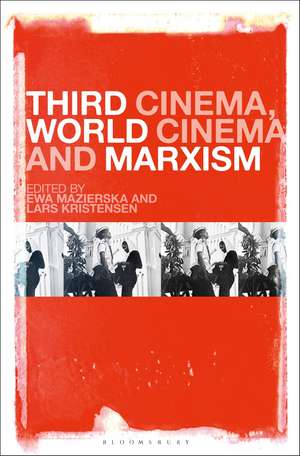Third Cinema, World Cinema and Marxism
Editat de Professor Ewa Mazierska, Lars Kristensenen Limba Engleză Paperback – 23 mar 2022
| Toate formatele și edițiile | Preț | Express |
|---|---|---|
| Paperback (1) | 199.03 lei 6-8 săpt. | |
| Bloomsbury Publishing – 23 mar 2022 | 199.03 lei 6-8 săpt. | |
| Hardback (1) | 716.24 lei 6-8 săpt. | +149.59 lei 4-10 zile |
| Bloomsbury Publishing – 16 sep 2020 | 716.24 lei 6-8 săpt. | +149.59 lei 4-10 zile |
Preț: 199.03 lei
Preț vechi: 258.54 lei
-23% Nou
Puncte Express: 299
Preț estimativ în valută:
38.09€ • 39.54$ • 31.76£
38.09€ • 39.54$ • 31.76£
Carte tipărită la comandă
Livrare economică 24 martie-07 aprilie
Preluare comenzi: 021 569.72.76
Specificații
ISBN-13: 9781501373848
ISBN-10: 1501373846
Pagini: 302
Ilustrații: 30 bw illus
Dimensiuni: 152 x 229 x 19 mm
Greutate: 0.4 kg
Editura: Bloomsbury Publishing
Colecția Bloomsbury Academic
Locul publicării:New York, United States
ISBN-10: 1501373846
Pagini: 302
Ilustrații: 30 bw illus
Dimensiuni: 152 x 229 x 19 mm
Greutate: 0.4 kg
Editura: Bloomsbury Publishing
Colecția Bloomsbury Academic
Locul publicării:New York, United States
Caracteristici
Examines the relationships between Third, First and Second cinemas, namely films made by filmmakers working under conditions of Western capitalism and state socialism, such as Mikhail Kalatozov and Ken Loach
Notă biografică
Ewa Mazierska is Professor of Film Studies at the University of Central Lancashire,UK. She has published over twenty monographs and edited collections on film and popular music, including From Self- Fulfillment to Survival of the Fittest: Work in European Cinema from the 1960s to the Present (2015) and European Cinema and Intertextuality: History, Memory, Politics (2011). She is principal editor of a journal Studies in Eastern European Cinema.Lars Kristensen is Lecturer in Media, Aesthetics and Narration at the University of Skövde, Sweden, where he teaches moving image theory to game developers. His research focuses on transnational and postcolonial filmmaking. He is the co-editor of Marx at the Movies (2014) and Marxism and Film Activism (2015).
Cuprins
Introduction: Ewa Mazierska and Lars KristensenPart 1: Revisiting FilmsChapter 1: Exporting Cinemarxism in the 1960s: The Case of Soy CubaAndrei RogatchevskiChapter 2: Brazil's Open Cities: Mimicry, Sexuality, and Class Dynamics in the Urban Landscape of Cinema NovoBruce WilliamsChapter 3: "Unreal City": The Aesthetics of Commitment in Pratidwandi and InterviewKoel BanerjeeChapter 4: The Peruvian Kuntur Group: A Marxist- Indigenist Filmmaking PracticeIsabel SeguíPart 2: Comparative ReadingsChapter 5: Third Cinema in the 21st century: political utopia in the new documentary films of Fernando SolanasMariano PazChapter 6: Third Cinema after the turn of the millennium: Reification of the sign and the possibility of transformationPaulina Aroch and André DorcéChapter 7: We Have Never Been Transnational: The Female Condition in Socialist Realism, Postsocialism, and Third CinemaLucian TionPart 3: Third Cinema versus World CinemaChapter 8: Dialogical Encounters on the Cinema of Revolution: Save the Children Fund Film and Metalepsis in BlackDavid Archibald and Finn Daniels-YeomansChapter 9: Newsreel Front: A Revived Vision of Third Cinema in SloveniaAndrej SprahChapter 10: Listening to the Future: The Film- Philosophy of Abderrahmane SissakoWilliam BrownChapter 11: Class, Gender and Ethnicity in Alfonso Cuarón's RomaEwa MazierskaChapter 12: 'After' or Back to Third Cinema? Plebeian Film, the National Popular, Fingernails and the Resilient BehemothEnrique Uribe-Jongbloed and Toby MillerIndex
Recenzii
[T]his elucidating book ... [highlights] the continued relevance and crucial importance of politically engaged film practices and scholarship in all their diversity.
Mazierska and Kristensen have put together a collection of bold, provocative and at times incendiary essays that challenge the alleged progressiveness of concepts such as world cinema and transnationalism by inviting Marxism back into the debate. The book succeeds in rescuing and reinvigorating the concept of Third Cinema by expanding it into other, hitherto unexplored avenues, and by opening its canon to overlooked works, past and present. In so doing, Third Cinema becomes Third Cinemas and World Cinema undergoes a fierce Marxist critique that puts its very relevance and validity to the test.
Mazierska and Kristensen have put together a collection of bold, provocative and at times incendiary essays that challenge the alleged progressiveness of concepts such as world cinema and transnationalism by inviting Marxism back into the debate. The book succeeds in rescuing and reinvigorating the concept of Third Cinema by expanding it into other, hitherto unexplored avenues, and by opening its canon to overlooked works, past and present. In so doing, Third Cinema becomes Third Cinemas and World Cinema undergoes a fierce Marxist critique that puts its very relevance and validity to the test.
